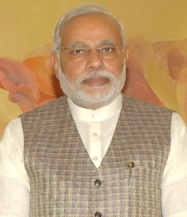Focus on `skill, scale and speed’ to compete with China: Modi
09 Jun 2014
Prime Minister Narendra Modi on Sunday outlined the vision for India's economic progress and emphasised the need to develop the necessary ''skill, scale and speed'' to compete with a fast-developing China.
 Speaking at a function to launch a book titled, Getting India Back on Track - an action agenda for reform, at his 7, Race Course Road residence, the prime minister said, ''If India has to compete with China, the focus should be on skill, scale and speed.''
Speaking at a function to launch a book titled, Getting India Back on Track - an action agenda for reform, at his 7, Race Course Road residence, the prime minister said, ''If India has to compete with China, the focus should be on skill, scale and speed.''
If India is to exploit the demographic dividend of the 65 per cent of its population that is below 35 years of age, he said, skill development needs to be a priority area.
Referring to skills such as teaching, nursing and paramedics, he said good teachers were one of the biggest needs of society, but there are very few good teachers available.
He said, in infrastructure, the focus needs to shift from highways to "i-ways", and optical fibre networks. He said cities in the past were built on river-banks. They are now built along highways. But in future, they will be built, based on availability of optical-fibre networks and next-generation infrastructure.
The prime minister said urbanisation should not be treated as a problem, but as an opportunity. In order to generate employment and change for the better, we plan to build 100 smart cities, he added.
India, he said, needs to bring about a second green revolution – focusing on increased agro-productivity, value addition, agro technology, and decentralisation of warehousing.
There is also the need for another white revolution that would focus on increasing milk productivity, and developing a support system for ensuring cattle health.
Modi also spoke of a blue revolution that would focus on the fisheries sector, including ornamental fish.
We also need a saffron revolution that focuses on renewable energy sources such as solar energy, to meet India's growing energy demand, he added.
Modi stressed on the need for water conservation, and emphasised the importance of micro-irrigation, which would lead to "per drop, more crop." He said micro-irrigation had been successful in improving productivity and quality in crops like sugarcane in Gujarat.
On the need to combat the challenge of global warming and climate change the prime minister said that a civilisation that treated rivers as mothers did not need to learn about environment protection from a western mindset.
Speaking on the occasion, minister for finance, corporate affairs and defence Arun Jaitley said governments should not only have the will to rule, but also the credibility to rule. He said the international community was once again looking at India, and it is an opportunity that we cannot afford to miss.
Earlier in the day, the foreign ministers of India and China, during their first engagement after the installation of the Narendra Modi-led NDA government, discussed the entire gamut of bilateral ties, including the contentious boundary issue.
Chinese foreign minister Wang Yi and external affairs minister Sushma Swaraj met for three hours on Sunday to talk about "perennial" bilateral issues which were not specified, but are believed to have included the boundary dispute, incursions, issuance of stapled visas by China to certain category of Indians, construction of dams on Brahmaputra river and increased Chinese investments.
Wang Yi, who arrived here as a special envoy of Chinese President Xi Jinping to meet with India's new leadership, said the new government has injected new vitality into an ancient civilisation.
"The international community is closely following developments in India and the Chinese and Indian dreams have a lot of commonalities," the Chinese leader was quoted as saying.
The talks were described as "cordial, useful, productive and substantive" by the MEA spokesperson, who said, "Even while there was a determination to add new content and substance to the relationship, there was an understanding that respect for the sensitivities and aspirations of each other was essential for expansion of bilateral relations."

















